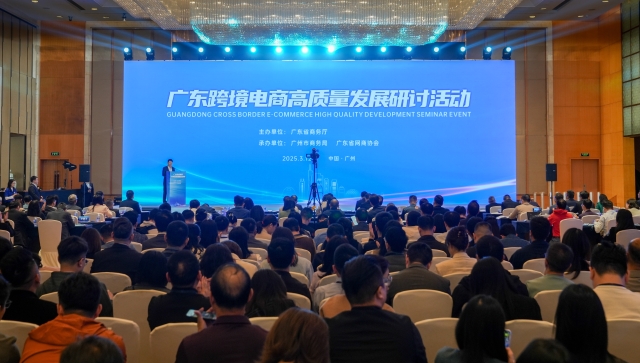03/13/2025 Source: GDToday
Share:

Guangdong held a cross-border e-commerce-themed event in Guangzhou on March 12.
Guangdong, China's manufacturing and foreign trade powerhouse, has rolled out groundbreaking policies to streamline cross-border e-commerce, achieving a record 745.4 billion yuan ($103 billion) in transactions in 2024, according to a cross-border e-commerce-themed event held by the Department of Commerce of Guangdong Province on March 12.
The province now hosts 21 national cross-border e-commerce pilot zones, with Guangzhou, Shenzhen, and Eastern Guangdong emerging as key hubs. Global giants like Amazon, SHEIN, and Alibaba International have established regional headquarters here, while 15 local companies, including Sailvan Times and Yidayun.com, have been listed.
Policy innovations fuel customs clearance efficiency
Guangdong has eliminated hurdles such as mandatory overseas warehouse registrations and complex export documentation. New pilot programs like "inspect-then-ship" for consolidated cargo and cross-regional returns—already operational in Guangzhou and Shenzhen—slash logistics costs by up to 30%. Customs data shows these reforms have boosted SME participation, with export declarations processed 50% faster since November 2023.
The province also bridges its manufacturing strengths with global demand through 100 annual "industry matchmaking" events. At a recent showcase, textile, electronics, and cosmetics suppliers from specialized industrial clusters connected with platforms and logistics providers.
"Guangdong's policy-engineered ecosystem turns local factories into global sellers," said Zhang Jinsong, Director-General of the Department of Commerce of Guangdong Province, announcing plans to expand the 2025 China (Guangzhou) Cross-Border E-commerce Fair, which is scheduled to be held in Guangzhou from August 15 to 17, to 50,000 sqm, featuring over 1,000 exhibitors.
Guangdong announced a batch of provincial-level industrial parks, representative enterprises, and public overseas warehouses in cross-border e-commerce during the event.

Overseas buyers chat with staff from a local company during the event.
Global platforms tap Guangdong's supply chain edge
International e-commerce players are racing to leverage the province's unmatched industrial networks. Amazon reported a 60% annual growth in Guangdong-based sellers exceeding $1 million in sales, attributed to initiatives like its Shenzhen tech hub and logistics partnerships with 15 cities. Russia's OZON plans a Guangzhou roadshow to source apparel and accessories for its 25 million users.
Domestic platforms are equally strategic: Alibaba's 1688.com, which sources one-third of its inventory from Guangdong, now deploys AI tools to help SMEs prototype products in 72 hours. "Guangdong isn't just a production base—it's becoming a global R&D and innovation hub for smart commerce," said Fan Min, a senior executive from 1688.com of Alibaba Group. With policy agility, industrial depth, and platform synergy, Guangdong is redefining cross-border trade—offering international businesses a launchpad into Asia's $3.8 trillion e-commerce market.